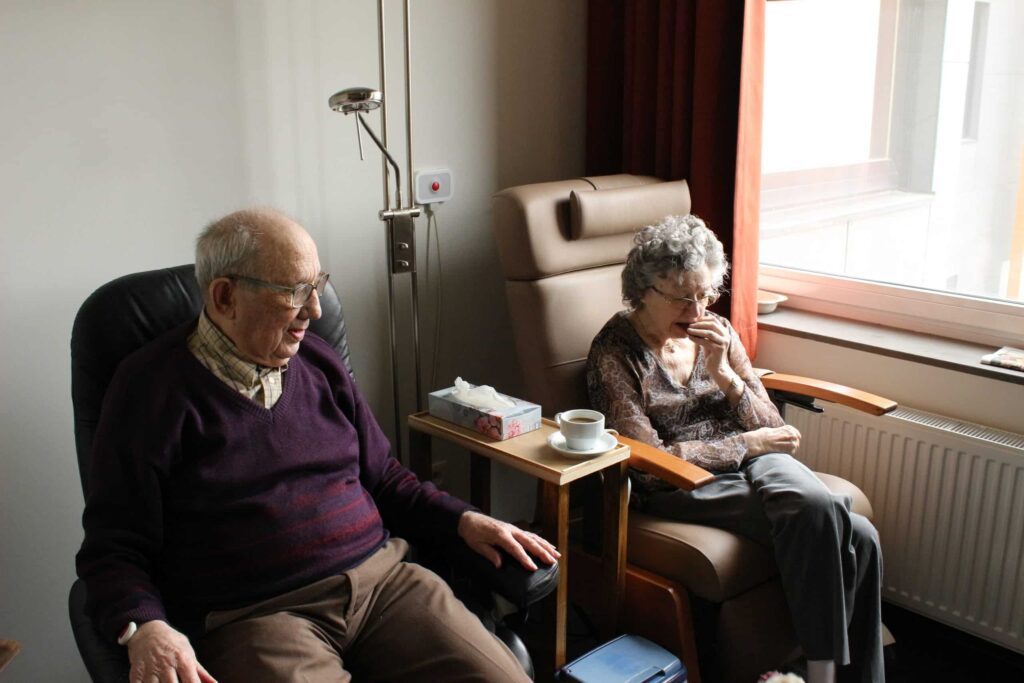Seniors may be more at risk for dehydration than many healthy younger adults. Unfortunately, dehydration can confuse, yet confusion may be a contributing factor to dehydration. Various factors make these problems of inadequate water levels and confusion more likely in older adults.
Causes of Dehydration in the Elderly
Dehydration, inadequate water in the body, tends to occur more frequently in older populations for various reasons. According to the Merck Manual reviewed by Dr. James L. Lewis entitled “Dehydration” and the 2nd edition of “Successful Nursing Assistant Care” by Diana Dugan, seniors are at increased risk for dehydration because:

- The elderly might not sense the feeling of thirst as quickly as someone younger.
- An older person’s sense of thirst might not be as strong as a younger person’s.
- Some seniors have limited mobility and may not be able to access an adequate water supply without assistance from another person or assistive drinking devices.
- Some older adults have problems swallowing liquids.
- Some older adults are confused or have dementia and may not be mentally capable of drinking water independently.
- A senior may not drink as many fluids as younger age groups.
- Some seniors fear incontinent episodes and may avoid drinking
- Those with conditions such as kidney failure may be on a fluid-restricted diet.
- The percentage of water in an older person’s body tends to be lower, particularly if they have increased body fat.
- Older adults may have more chronic conditions, such as diabetes or cancer, that can increase the risk for dehydration.
- Seniors typically have lowered immunity to acute illnesses such as food poisoning and may experience more severe complications in a shorter period.
- Some older adults may take medications, such as “fluid pills,” that increase urinary output.
Causes of Dehydration in Seniors
Dehydration is more likely to occur in warmer weather or when an older adult increases activity without increasing fluid intake. Drinking inadequate fluids is a common risk factor for dehydration in older adults.
Anything that increases urinary output can potentially put an elder at risk for dehydration. In addition, having diabetes, Addison’s disease, taking certain medications, or having other chronic conditions can also increase a person’s risk for dehydration.
Acute illnesses can also increase an older person’s likelihood of becoming dehydrated, particularly if the illness produces a fever, vomiting, and diarrhea. For example, if an elder develops vomiting and diarrhea, they may not rehydrate their body adequately.
Signs and Symptoms of Dehydration in Older Adults
Dehydration may occur very quickly in elders, particularly those who are frail. Symptoms tend to start mild initially but will become more severe as the body’s water needs increase without being met.
Some symptoms to indicate that a senior may be dehydrated include:
- Thirst (This symptom may be subdued, unable to determine or verbalize, or absent in the elderly)
- Decreased sweat
- Skin becomes less elastic (decreased turgor)
- Dry or cracked lips
- Dry mouth and mucous membranes
- Sunken eyes
- Flushed look on the face
- Urine output is less, dark and concentrated, or absent
- Low blood pressure (hypotension)
- Fast, weak, and/or irregular pulse
- Headache and/or irritability
- Loss of balance and/or dizziness
- High sodium (salt) levels in the blood
Damage to internal organs, such as the liver, kidneys, and brain, can be damaged with severe confusion. Confusion may be a strong indicator that dehydration has progressed to a severe level and can lead to coma.
Dehydration Can Lead to Confusion in Elders
Dehydration, a lack of adequate bodily fluids, is a common problem in aging populations due to various risk factors. Fortunately, dehydration can often be prevented by drinking recommended amounts of fluids for a person’s age, activity, and environmental conditions.
Early warning signs of dehydration might be missed or not noticed in older adults until they become confused. Many people assume that confusion is a normal change of aging. However, new or increased confusion in an older adult warrants an assessment by a healthcare professional. Many causes of sudden confusion are reversible with prompt and appropriate treatment.
This article is for informational purposes and should not be considered medical advice. Want more helpful senior living advice?

Jay
Jay is a health and wellness enthusiast with expertise in water quality and nutrition. As a knowledgeable advocate for holistic well-being, Jay successfully manages Type 2 Diabetes through informed lifestyle choices. Committed to sharing reliable and authoritative insights, Jay combines firsthand experience with a passion for enhancing health."

